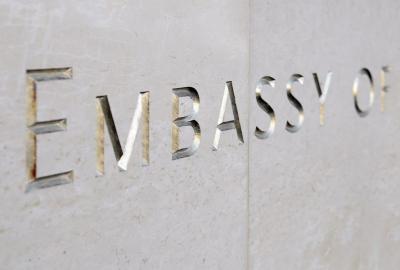The artful dodgers of the embassies saved by the PD

ROME - Candlelit dinners, rented houses for lovers and second wives, all kinds of maintenance costs, real estate brokerages, photographic services, meetings in luxury hotels, chartered yachts, specials in newspapers and on TV, nights at 5-star hotels in capital cities, high level lobbying activities. The list of “things” that foreign ambassadors and consuls don’t pay for is long, worth hundreds of thousands of euros each year and produce unimaginable disputes out-of-court as well as in the courtroom. Yet many cases go on for years without achieving any positive results.
The Ministry of Foreign Affairs’ (MFA) organization chart even has a Diplomatic Advisor that moderates the diplomatic offices’ debtors and creditors. There’s also a dossier that accurately photographs the phenomenon of non-payments by foreign representatives in Italy, in all those cases – which are the minority – where the Ministry governed by Paolo Gentiloni is called into question. Behind the relationship between Italy and countries of the highest order accused of defaulting or being in arrears, there lies a sort of state secret. It’s known, from data gathered in a report dating back to 2014, that in 2013 alone, approximately 70 new disputes were generated for unprecedented work and professional services.
There are countless cases. There’s Mario Rossi (not his real name, ed.), who’s been waiting to receive around 50,000 euros from the United Arab Emirates’ embassy for a year and a half, after he carried out public relations for them at the highest level. That directly gave rise to a meeting between Pietro Grasso, the state’s second-highest ranking officer, and Saqer Alraisi, the ambassador who’s come under scrutiny for other dealings and was recently summoned back to his homeland.
Efforts have been made to obtain what was agreed on, but to no avail so far. A series of 'verbal notes' (this is what the notes in diplomatic correspondence are called, ed.), sent by the MFA to demand the payment of the reimbursement has not produced any results either. Nothing short of astonishing is the case of John Phillips, a former Times journalist and current editor of the Italian Insider. In September 2014, Phillips agreed with Ali Khaled Al Jaber Al Sabah, ambassador of Kuwait, to produce a report dedicated to the 50th anniversary of the relations between Kuwait and Italy. The material, which took at least three months to produce, was prepared and delivered as a draft to the diplomat’s close associate. The invoice of the deposit was sent, although never paid. The non-payment of the fee came hand-in-hand with the interruption of any communication between the embassy and Phillips. He then decided to take the case to a law firm in order to recover at least 10,000 euros. Phillips, to date, has not even received a small advance payment.
A Roman photojournalist has also been trying to claim over 5,000 euros from the embassy of the Republic of Angola for years, after having carried out a series of photographic works commissioned and delivered during 2011 and 2012. It remains unknown as to why the embassy has defaulted on its commitments to the photojournalist, and so far, none of the professional’s efforts to receive payment have proved fruitful, even with the help of a lawyer: several emails have been left unanswered, registered mail hasn’t generated any reaction, as well as a series of warnings and formal notices to the Embassy. The only option left would be to take the case to court. However, in addition to the uncertain outcome, it would cost significantly more than the object of the dispute.
Besides the damages due for not receiving payment, he’s experienced a real slap-in-the-face in the last few months, to do with the fact that the “artful dodgers of the embassies” are effectively safeguarded from the legitimate claims of their creditors. The context was set out in a decree signed by Matteo Renzi, which has since become the law, ("urgent measures of de-jurisdiction and other actions to answer the backlog of civil proceedings", is the title of the law, ed.). Giuseppe Luigi Salvatore Cucca, one of the many peons of the Democratic Party in the Senate, was the architect of the clause that makes the current accounts of foreign diplomatic offices’ impenetrable, even in the case of a judicial sentence.
This is how the incriminating clause, called 'Credit claims from diplomatic missions and foreign consular offices', reads: "The sums deposited in current or postal bank accounts, available to the parties referred to in article 21, paragraph 1, letter a) of the United Nations Convention on the jurisdictional immunities of States and their assets, adopted in New York on December 2, 2004 under the Law n. 5 of January 14, 2013, are not subject to forced execution under penalty of nullity, even if ex officio; the sums, in relation to the Head of the Representation of the consular post or director, denominated the international organization in Italy, with a document previously communicated to the Ministry of Foreign Affairs and International Cooperation, as well as the company authorized to carry out banking activities in which the same sums are also deposited, must exclusively be destined to fulfil the functions of the subjects referred to in this clause ".
It seems that as soon as this law was launched, there was a literal rush amongst embassies and consulates to show the Ministry declarations that the sums of money deposited in the bank were intended for functions of diplomatic representation. They did this, in fact, by making current reports of individual representations abroad.
@albcrepaldi
First published in Gli Stati Generali on 13 Oct 2016
Translated by Flavia Cresswell-Turner


